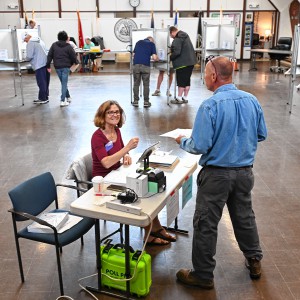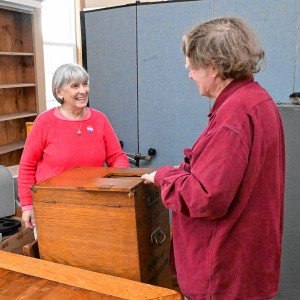Rep: Healey’s arrival changes outlook for aid in dying bill
| Published: 05-05-2023 4:39 PM |
BOSTON — Top House and Senate Democrats have not publicly mentioned legalizing medical aid in dying as a priority, but one legislative sponsor believes the chances of action are better than ever now that Gov. Maura Healey is in the corner office.
Rep. Jim O’Day said Wednesday that the long-debated, controversial measure previously rejected by voters did not advance in previous sessions in large part because its backers “didn’t know what Governor (Charlie) Baker would do should this bill reach his desk.”
Joining advocates who back the proposal at a virtual briefing, O’Day said the Republican governor’s uncertain stance meant legislative supporters might have needed to secure a full two-thirds majority to protect against an override, rather than the simple majority that can send a bill to the governor.
“When you vote on a bill that your executive officer may not support and we want to make sure such a bill gets passed, we need to have two-thirds support to override that veto,” O’Day said. “I think those numbers are changing this session. From all outward appearances, our current governor, I believe, with the safeguards with our current iteration of the bill, would support this bill. We now go from having to have 107 votes to only needing 81 in the House. I think we’re very close to that number.”
Voters narrowly rejected a ballot question in 2012 that would have authorized licensed physicians to provide prescription medicine that would end the life of a willing, mentally capable adult diagnosed with a terminal illness likely to cause their death within six months.
Since then, supporters have been unable to secure momentum among the legislative leaders whose preferences shape which bills get floor votes and which languish in committees, even as other states continue to allow or even expand the practice.
Gov. Phil Scott of neighboring Vermont on Tuesday signed a bill that allows residents from other states to travel there and make use of its aid in dying law, bringing an end to a Vermont residency requirement.
The End of Life Options MA Coalition argued Wednesday that public support is firmly behind the proposal, publishing results from a Beacon Research poll that found nearly three-quarters of voters support legalizing medical aid in dying.
Article continues after...
Yesterday's Most Read Articles
 Serious barn fire averted due to quick response in Shelburne
Serious barn fire averted due to quick response in Shelburne
 Bridge of Flowers in Shelburne Falls to open on plant sale day, May 11
Bridge of Flowers in Shelburne Falls to open on plant sale day, May 11
 Political newcomer defeats Shores Ness for Deerfield Selectboard seat
Political newcomer defeats Shores Ness for Deerfield Selectboard seat
 Roundup: Pioneer baseball wins Suburban League West title following 2-0 win over Hopkins
Roundup: Pioneer baseball wins Suburban League West title following 2-0 win over Hopkins
 As I See It: Between Israel and Palestine: Which side should we be on, and why?
As I See It: Between Israel and Palestine: Which side should we be on, and why?
 Employee pay, real estate top Erving Town Meeting warrant
Employee pay, real estate top Erving Town Meeting warrant
Chris Anderson, president of Beacon Research, said the findings line up with a 2022 poll from Suffolk University and the Boston Globe.
“We’re seeing very high, stable support for this. It’s notably higher than it was a decade ago when this question made it onto the ballot,” Anderson said at the virtual briefing. “It seems like the support statewide is high and stable and increased.”
The topic has long been a controversial one, generating hours of intense testimony at committee hearings. Opponents argue that legalizing the practice of medical aid in dying could expose patients with disabilities or terminal illness to new risks and would violate medical ethics.
Last year, the Supreme Judicial Court ruled that medical aid in dying is not a protected constitutional right in Massachusetts and could be prosecuted as manslaughter, emphasizing any decision on it is “best left to the democratic process.”
Neither House Speaker Ron Mariano nor Senate President Karen Spilka has named action on the topic a priority for the 2023-2024 session.
A Healey spokesperson said Wednesday that the Democrat “supports legislative action to allow medical aid in dying, provided it includes sufficient safeguards for both patients and providers,” without detailing any specific safeguards she views as necessary. Healey has not proposed a bill on the topic.
JoAnn Vizziello, who was diagnosed with an incurable blood cancer in 2016, told reporters Wednesday that she wants Massachusetts to implement a medical aid in dying law so she can have “the comfort of knowing that I can have a peaceful death” if her illness progresses.
“Opponents often raise concerns about the possibility of coercion, but we don’t need to speculate about this. There’s more than 25 years worth of data from multiple jurisdictions who have already passed bills similar to our medical aid in dying bill,” Vizziello said. “That data shows that there has not been a single substantiated case of abuse or coercion, nor have there been any civil or criminal charges filed related to this practice — not one.”
“And speaking of other jurisdictions with similar bills, what does it say about our state when residents must leave in order to obtain access to medical aid and dying?” she asked.

 No surprises in Wendell election
No surprises in Wendell election New Salem election ushers in new Selectboard member
New Salem election ushers in new Selectboard member
